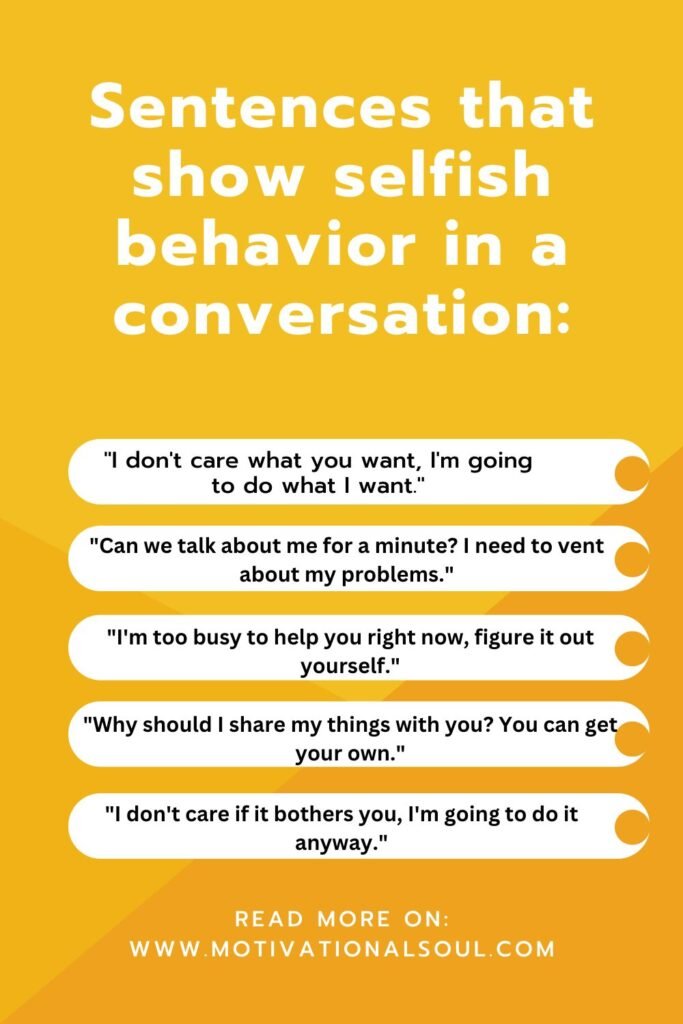The Secret Signs of Selfish People


Selfishness is often painted as an undesirable trait that can sabotage genuine connections. But it doesn’t have to linger on the dark side—when channeled with intention, a healthy dose of self-interest can empower us to direct our own destinies, prioritize deeply held aspirations, and even cultivate fulfilling relationships. In this post, I’m excited to unveil the hidden clues that reveal when someone harnesses self-focus to unlock what they truly want in life.
Whether you’re stepping into the job market for the first time or have been around the block and want fresh insights into making the most of your unique strengths, I’m convinced these qualities will give you the upper hand in achieving success—professionally and personally. Keep reading to unearth the subtle yet powerful traits that characterize today’s most relentless go-getters!
What is Selfishness and How Can It Be Beneficial
Selfishness tends to carry a tarnished reputation, often dismissed as a personality flaw that distances us from people who matter. Yet there’s a hidden dimension to selfishness that, when wielded with genuine motives, can be an invaluable skill. A balanced approach means looking after our own well-being without neglecting the bonds we cherish.
Healthy selfishness encourages us to maintain personal boundaries and stand by our core principles—ensuring we aren’t exploited in our daily lives or careers. Cultivating the discernment to separate true self-care from mere overindulgence helps us use this trait effectively and reap its rewards.
The Benefits of Thinking About Yourself First
Despite the negative connotations, there’s no shame in occasionally putting yourself first. Prioritizing your own needs can boost mental and physical wellness, ultimately helping you become more present and supportive for others. Selfishness, in measured doses, opens a space for rest, rejuvenation, and exercise—allowing you to regain focus and confidence.
Stepping away from your responsibilities, even briefly, lets you recharge and return with a clearer mindset. Being a bit selfish once in a while can illuminate what truly counts, guiding your decisions toward what feels right. In short, looking after yourself isn’t all bad!
It’s not selfishness to do what is best for you. – Mark Sutton
Signs You Have a Healthy Level of Self-Interest
Self-interest doesn’t always deserve the blame for selfish behavior. In reality, possessing a reasonable measure of it can be advantageous in both personal and professional realms. It enables you to stand your ground during tricky discussions, conveying your needs without feeling overshadowed. It also shapes your limits, letting you articulate your position with clarity and respect.
Indications of robust self-interest include confidently occupying space; recognizing your desires, boundaries, and non-negotiables; investing energy in self-reflection and self-care; and graciously accepting praise while acknowledging your own abilities. Achieving healthy self-interest doesn’t mean you become cold or aloof—it’s about balancing what’s right for you and others so everyone can thrive together.
Love yourself first
How to Set Appropriate Boundaries for Yourself
Mastering boundaries can feel like a powerful secret to regaining control of your life and cultivating the best version of yourself. Although it may seem paradoxical, learning to protect your energy is pivotal for combating burnout and exploitation. We all deserve a touch of selfishness to safeguard our mental and emotional well-being.
Establishing boundaries goes beyond simply saying “no”—it involves recognizing what matters most to you and organizing your choices around those priorities. Remember, nurturing yourself isn’t indulgent or egocentric—it’s essential.
Even the nicest people have their limits.
Strategies for Overcoming Unhealthy Levels of Selfishness
Excessive selfishness can backfire in a world that hinges on collaboration and empathy. Fortunately, there are practical ways to rein in self-centeredness before it festers into something damaging. By nurturing empathy and consideration for others, you raise your awareness and become more mindful of your own behavior.
Recognizing the influence of kindness—both toward yourself and those around you—keeps you humble and approachable. Setting and respecting boundaries is pivotal here: it helps you maintain a reasonable level of involvement in others’ lives while still being present when they need you. With deliberate effort, these methods won’t just reduce unhealthy selfishness but also enrich your overall relationships.
Be selfish enough to have self-love
Learning to Balance Your Needs and Those of Others
A touch of self-centeredness is essential for everyone. It protects your own needs from drowning in the chaos of life. Yet too much can strain relationships, underscoring the importance of blending your personal priorities with the well-being of those you care about. Finding this sweet spot might require trial and error, but once you nail it, the benefits are immense.
Stepping back to assess your current balance of self-sacrifice and self-focus can lead to rewarding insights about yourself and your circle. By weighing what’s right for you against what’s best for others, you’ll cultivate better self-awareness and healthier bonds.
Selfcare is not selfish.
Ultimately, being selfish is about looking after yourself first, ensuring you remain grounded and able to navigate life with a clear mind. While it’s natural to have episodes of self-sacrifice, consistent and mindful attention to your needs is what truly sustains physical and emotional wellness. When you strike the right balance between self-interest and consideration for others, your decisions will reflect what’s best for everyone involved.
Ask yourself: How can I nurture my personal journey while also supporting those who matter? That line of thinking nurtures both your own growth and the relationships you value. Thank you for reading; I hope this post inspires a thoughtful recalibration of your healthy selfishness!



Recent Comments